LG
Gram
17:
Two-minute
review
The
LG
Gram
17
is
a
large
but
super-light
and
thin
laptop,
promising
premium
productivity
performance
in
a
portable
package.
Design-wise,
the
LG
Gram
17
is
clean
and
sleek,
keeping
all
its
angles
and
surfaces
as
minimal
as
possible.
As
for
build
quality,
the
plastic
body
doesn’t
inspire
much
confidence,
although
there’s
no
denying
it
saves
weight.
I
found
the
hinge
for
the
lid
very
loose,
resulting
in
the
display
repeatedly
rebounding
on
opening
the
laptop,
which
in
my
mind
casted
doubt
over
its
durability.
The
IPS
display
is
certainly
large,
but
it
isn’t
exactly
vibrant.
Colors
are
rendered
perfectly
well,
but
LED
and
OLED
displays
are
usually
more
impressive,
even
those
with
the
same
2K
resolution
of
the
LG
Gram
17.
However,
it
does
excel
at
preventing
glare,
as
per
LG’s
claims;
I
tried
using
it
in
various
areas
around
my
living
space
to
produce
some
unfavorable
angles
for
sunlight,
and
couldn’t
catch
it
out
–
it
remained
clear
in
most
conditions.
In
terms
of
performance,
the
LG
Gram
17
handles
the
tasks
it’s
designed
for
with
aplomb.
The
model
on
test
was
equipped
with
an
Intel
Core
Ultra
7
and
32GB
of
RAM.
It
made
short
work
of
spreadsheet
creation
and
word
processing,
and
could
deal
with
light
photo
editing.
It
also
played
back
HD
and
4K
video
content
with
ease.
During
our
benchmarking,
it
outperformed
many
of
the
best
laptops
–
such
as
the
Microsoft
Surface
7
–
for
productivity. However,
it
wasn’t
as
impressive
when
it
came
to
GPU
workloads,
including
gaming.
The
Intel
Arc
GPU
can’t
match
other
high-end
GPUs,
such
as
the
Nvidia
GeForce
RTX
4060
in
the
Dell
XPS
17
(9730)
we
tested.
Mercifully,
the
LG
Gram
17
is
mostly
free
from
the
bloatware
that
can
plague
other
Windows
laptops.
LG’s
software
suite
is
mixed
in
terms
of
usefulness,
but
it
wasn’t
too
intrusive
or
resource-heavy.
The
most
egregious
app
was
LG
Recovery
and
Update,
but
this
only
popped
up
occasionally,
and
offered
desirable
updates
when
it
did
–
although
it
did
fail
to
make
clear
that
some
updates
will
cause
the
system
to
shut
down
without
notice.
The
most
useful
tool
in
the
suite
is
LG
Gram
Link,
which
allows
you
to
connect
mobile
devices
to
transfer
files
and
mirror
screens
both
ways.
You
can
also
use
it
to
control
your
mobile
device
with
the
LG
Gram
17’s
trackpad
and
keyboard.
For
the
most
part,
all
these
functions
work
as
intended,
although
lag
and
slowdown
can
be
an
issue
at
times.
The
battery
is
very
good
for
this
class
of
laptop,
lasting
more
than
12
hours
in
our
tests,
which
involved
a
battery
benchmark
using
PCMark,
in
addition
to
running
a
1080p
30fps
video
on
a
continuous
loop.
For
comparison,
the
Dell
XPS
17
(9730)
only
managed
a
little
over
nine
hours,
while
the
Microsoft
Surface
7
quit
after
10
hours.
One
of
the
major
problems
with
the
LG
Gram
17,
though,
is
the
noise
and
heat
it
generates
under
load.
This
was
apparent
even
during
setup,
with
the
fans
whirring
up
near
the
start
of
the
process.
The
low-pitched
hum
would
then
elevate
during
heavy
workloads,
to
the
point
of
becoming
distracting.
The
underside
and
the
keys
also
became
very
hot
to
the
touch,
giving
me
cause
for
concern.
Another
issue
that
severely
hampers
the
LG
Gram
17
is
the
keyboard.
Although
I
usually
welcome
the
inclusion
of
a
number
pad,
here
it
forces
the
character
keys
too
far
to
the
left,
creating
an
awkward
typing
position.
It
also
means
the
palm
of
your
right
thumb
rests
on
the
trackpad,
with
movements
being
registered
as
cursor
swipes
and
sometimes
even
taps.
In
addition,
the
keys,
while
they
feel
satisfying
and
pleasant
to
tap,
can
sometimes
fail
to
register,
especially
the
“o”
key,
which
caused
me
no
end
of
frustration.
This
is
a
hotly
contested
space,
and
you’d
expect
the
LG
Gram
17
to
deliver
on
its
premium
promises
given
the
price
it
commands.
However,
there
are
simply
better
value
alternatives
that
offer
not
just
lightning
performance,
but
also
a
better
design
and
user
experience.
If
you’re
after
a
large
laptop
with
plenty
of
power,
then
the
Dell
XPS
17
(9730)
is
a
solid
choice.
If
you
want
a
smaller
form
factor
but
still
want
performance,
then
our
current
pick
as
the
best
laptop
around,
the
Microsoft
Surface
7,
would
be
a
great
alternative.
LG
Gram
17:
Price
&
availability
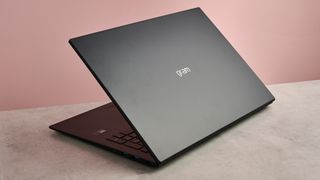
(Image
credit:
Future)
-
£1,999
(about
$2,640
/
AU$3,910) -
Available
in
three
colorways -
High-end
specs
The
LG
Gram
17
costs
£1,999
(about
$2,640
/
AU$3,910)
and
is
available
now.
It
arrives
in
your
choice
of
three
finishes
–
black,
white,
or
charcoal
gray
– and
it
can
be
had
with
between
16-32GB
of
LPDDR5x
RAM,
and
a
1TB
or
2TB
NVMe
SSD.
As
for
graphics,
you
have
a
choice
of
either
an
Intel
Arc
or
Intel
Iris
XE
Graphics
GPU.
At
this
price,
the
LG
Gram
17
is
competing
in
the
premium
sector,
rubbing
shoulders
with
the
likes
of
the
Lenovo
ThinkPad
X1
Yoga
Gen
8
–
which,
in
our
view,
is
the
best
business
laptop
.
That
machine
is
superbly
built
with
an
excellent
keyboard
and
display.
Specs-wise,
it
does
come
in
behind
the
LG
Gram
17,
and
so
do
its
costlier
range-topping
variants.
However,
the
ThinkPad
X1
Yoga
Gen
8
is
durable
and
built
to
last,
delivering
your
money’s
worth.
At
the
other
end
of
the
market
sits
the
Acer
Travelmate
P4,
which
can
be
had
for
as
little
as
$400.
For
that,
you
do
get
lesser
specs,
with
older
CPUs
and
no
NVMe
SSD
options,
but
we
still
found
it
to
be
a
very
competent
performer.
If
you
desperately
want
a
17-inch
display,
then
we
think
the
Dell
XPS
17
(9730)
is
the
best
laptop
with
a
large
screen.
It’s
also
replete
with
Nvidia
GeForce
RTX
40
series
GPUs,
perfect
if
you’re
after
serious
gaming
and
content
creation
pedigree.
LG
Gram
17:
Specs
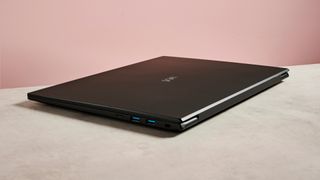
(Image
credit:
Future)
to
scroll
horizontally
|
Header Cell – Column 0 |
LG Gram 17 (2024) |
|---|---|
|
Price |
£1,999 (about $2,640 / AU$3,910) |
|
Display |
17-inch, 2560×1600, 16:10 60Hz IPS w/ anti-glare coating |
|
CPU |
Intel Core Ultra 7 155H |
|
Graphics |
Intel Arc |
|
RAM |
32GB LPDDR5x |
|
Storage |
1TB NVMe PCIe Gen 4 SSD |
|
Ports |
2 x USB 4 Type C, 2 x USB Type A 3.2, 1 x 3.5mm combo jack, HDMI, microSD slot |
|
Connectivity |
Wi-Fi, Bluetooth 5.3 |
|
Battery |
77Wh Li-Ion |
|
Weight |
2.98lbs (1.35kg) |
|
Dimensions |
14.91 x 10.19 x 0.70ins (378.8 x 258.8 x 17.8mm) |
LG
Gram
17:
Design
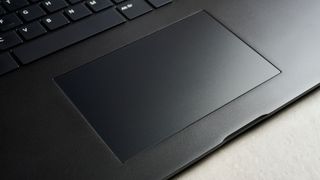
(Image
credit:
Future)
-
Very
light
for
a
large
laptop -
Number
pad
compromises
ergonomics -
Keystroke
and
trackpad
issues
As
with
many
Windows
laptops
in
recent
years,
the
LG
Gram
17
takes
design
cues
from
Apple’s
MacBook
line.
It
keeps
to
a
minimal
aesthetic,
with
clean
edges
and
surfaces
unsullied
by
unnecessary
bulges
or
protrusions.
However,
almost
immediately
on
opening
its
lid
my
confidence
in
the
build
quality
of
the
LG
Gram
17
was
sapped.
The
hinge
is
incredibly
loose,
meaning
the
display
ricochets
like
a
pendulum.
It
could
be
argued
this
is
the
price
you
pay
for
such
an
effortless
mechanism,
but
I
don’t
think
this
bodes
well
for
its
longevity.
In
fact,
the
premium
feel
is
lacking
from
the
entire
chassis
–
although,
again,
this
may
be
the
sacrifice
for
keeping
the
LG
Gram
17’s
weight
down.
And
for
a
17-inch
laptop,
it’s
impressively
light
and
thin,
which
makes
traveling
with
it
far
less
hassle
than
it
otherwise
would;
it
slotted
nicely
into
my
backpack
for
my
commute
to
the
office,
and
I
didn’t
feel
overburdened.
There’s
no
doubt
that
as
large
laptops
go,
the
LG
Gram
17
is
one
of
the
most
portable
around.
The
keys
are
compact
and
well
made.
The
trackpad
is
highly
engineered
and
large,
too,
with
a
very
smooth
surface
that
creates
little
friction.
This
makes
for
pleasant
and
precise
swipes
and
gestures.
As
fond
as
I
am
of
number
pads,
incorporating
one
in
the
LG
Gram
17
does
compromise
its
ergonomics.
It
means
the
character
keys
are
forced
over
to
the
left,
which
I
found
made
the
typing
position
more
awkward,
with
my
right
hand
closer
to
the
left
than
I’m
used
to.
It’s
welcoming
to
see
a
large
screen
that
isn’t
compromised
by
a
thick
bezel.
What’s
a
shame,
though,
is
how
much
the
bezel
protrudes
on
the
LG
Gram
17,
with
the
display
itself
set
quite
far
back
–
another
area
where
you
can
tell
corners
have
been
cut,
and
where
it
fails
to
live
up
to
the
sleekness
of
Apple’s
laptops,
despite
its
attempts
to
emulate
their
style.
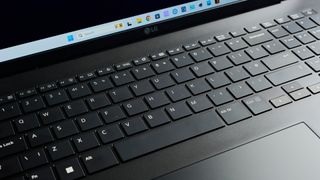
(Image
credit:
Future)
The
display
itself
uses
IPS
technology,
which
produces
a
fine
enough
image.
However,
it
fails
to
impart
a
level
of
sharpness
you’d
expect
from
the
2L/
WQXGA
resolution.
On
smaller
screens
that
same
resolution
looks
sharp
and
sleek,
but
that
fidelity
starts
to
deteriorate
once
it’s
stretched
out
to
17-inch.
However,
what
can
be
said
in
its
favor
is
its
anti-glare
properties,
which
do
indeed
help
to
retain
visibility
even
in
bright
sunlight.
As
for
port
selection,
the
LG
Gram
17
has
two
USB-C
and
two
USB-A
ports,
the
former
pair
on
the
left
and
the
latter
on
the
right.
There’s
also
a
headphone
output,
a
microSD
card
slot,
and
an
HDMI
port.
Oddly,
the
latter
is
located
before
the
USB-C
ports,
meaning
that
your
charging
cable
will
be
plugged
in
closer
to
the
front
than
you’d
expect,
which
might
upset
those
who
are
particular
about
cable
management.
The
keys
are
well
damped
with
just
enough
travel,
making
for
a
snappy
and
satisfying
feel.
However,
all
too
frequently
my
keystrokes
would
fail
to
register,
in
particular
when
hitting
the
“o”
key,
for
reasons
I
struggle
to
fathom.
As
a
conservative
estimate,
I’d
say
that
more
than
half
the
time
presses
would
result
in
nothing
appearing
on-screen.
Another
typing
issue
is
the
aforementioned
position
of
the
character
keys.
As
well
as
making
the
hand
position
awkward,
it
also
resulted
in
my
right
thumb
palm
resting
on
part
of
the
trackpad.
Occasionally,
this
would
cause
swipes
and
taps
to
register.
For
any
laptop,
these
two
issues
pose
a
major
obstacle
for
getting
work
done.
However,
for
one
such
as
the
LG
Gram
17,
designed
with
productivity
in
mind,
it’s
close
to
unforgivable.
These
may
just
be
personal
issues,
with
others
unaffected;
but
I’ve
never
had
typing
issues
to
this
degree
on
other
laptops
I’ve
tried.
Conversely,
I
also
experienced
too
many
occasions
where
the
trackpad
would
fail
to
register
taps
I
performed
deliberately.
However,
in
other
aspects,
the
trackpad
is
great
to
use.
It’s
smooth
and
accurate,
while
swipes
and
gestures
are
easy
to
perform
consistently,
thanks
to
the
responsiveness.
LG
Gram
17:
Performance
The
LG
Gram
17
is
fast
when
it
comes
to
performing
most
productivity
tasks.
Everything
from
knocking
out
spreadsheets
and
word
processing
to
low-key
photo
editing
is
within
reach.
And,
when
it
comes
to
downtime,
video
playback
is
fast
and
smooth,
even
with
4K
content.
The
Intel
Core
Ultra
7
certainly
appears
to
live
up
to
expectations.
LG
Gram
17:
Benchmarks
3DMark:
Night
Raid:
16,752;
Fire
Strike:
6,131;
Time
Spy:
2,908
Cinebench
R23:
1,595
(single-core);
9,746
(multi-core)
GeekBench
6.3:
2,198
(single-core);
11,358
(multi-core)
PCMark
10
(Home
test):
6,039
PCMark
10
(Battery
test):
5,477
Battery
Life
(TechRadar
movie
test):
12 hours,
12 minutes
For
more
intensive
workloads,
the
LG
Gram
17
is
somewhat
inconsistent.
In
our
benchmarking
tests,
it
scored
well
on
office-based
tasks.
It
beat
the
Microsoft
Surface
7
in
the
PCMark
Home
test,
although
it
did
lose
to
it
in
GeekBench
single-
and
multi-core
tests
with
considerably
lower
scores.
For
more
graphics-heavy
workloads,
scores
weren’t
so
great
either.
The
LG
Gram
17
still
beat
the
Surface
7,
but
in
our
Dell
XPS
17
(9730)
review,
this
laptop
performed
far
better
–
not
exactly
surprising,
given
the
LG
Gram
17
I
had
to
test
came
with
an
Intel
Arc
GPU,
rather
than
an
Nvidia
GeForce
RTX
4060
featured
in
the
XPS
17
(9730)
we
tested.
Thankfully,
the
LG
Gram
17
keeps
the
bloatware
to
a
minimum,
with
only
a
handful
of
LG
apps
preinstalled.
Most
of
these
function
well
for
the
most
part,
and
refrain
from
eating
into
performance
or
bombarding
you
with
notifications.
The
LG
Recovery
and
Update
can
intrude
at
times
with
notifications;
but,
thankfully,
most
of
them
are
worthy
of
your
attention.
Other
LG
apps
include
ThinQ,
which,
quite
frankly,
seemed
redundant,
only
letting
me
contact
support;
and
LG
Gram
Link,
which
lets
you
connect
with
your
mobile
device,
allowing
for
file
sharing
to
screen
mirroring.
Both
function
well,
although
the
mobile
app
did
have
trouble
connecting
to
my
network
until
an
update
fixed
the
issue.
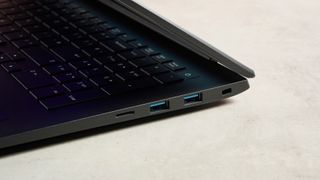
(Image
credit:
Future)
Mirroring
my
phone
screen
on
the
LG
Gram
17
worked
well,
but
keyboard
and
trackpad
inputs
were
sluggish.
You
can
also
duplicate
and
extend
the
LG
Gram
17
display
on
your
smartphone,
and
this
is
more
responsive,
although
I
think
it
would
be
better
to
mirror
on
a
tablet
than
a
small
smartphone
screen.
Using
the
keyboard
and
trackpad
to
control
my
phone
was
also
responsive
during
my
tests,
although
for
some
reason
I
wasn’t
able
to
scroll
web
pages
on
the
Chrome
mobile
app.
One
of
the
chief
annoyances
I
had
with
the
LG
Gram
17
was
the
noise.
Occasionally
–
and
especially
when
setting
up
–
there
would
be
a
low-end
hum,
elevating
to
a
higher
pitch
and
louder
volume
under
more
intensive
workloads.
I
was
almost
convinced
it
was
the
sound
of
a
hard
disk,
as
it
sounded
very
similar.
After
the
initial
setup,
fan
noise
became
less
frequent,
but
would
still
rear
its
ugly
head
from
time
to
time.
In
addition,
the
base
of
the
LG
Gram
17
would
also
on
occasion
become
hot,
which
would
be
uncomfortable
if
using
the
machine
on
your
lap.
Sometimes,
even
the
keys
themselves
became
hot
to
the
touch.
This
was
a
real
cause
for
concern,
and
didn’t
instill
me
with
much
confidence
to
use
the
LG
Gram
17
for
heavy
workloads
over
long
stretches.
As
far
as
the
speakers
go,
they
perform
well
enough,
offering
a
balanced
sound
without
distortion.
They
don’t
have
much
impact,
but
compared
to
most
other
laptops,
they
acquit
themselves
admirably.
LG
Gram
17:
Battery
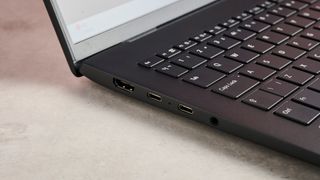
(Image
credit:
Future)
Although
LG
doesn’t
provide
a
figure
for
the
battery
life
of
the
Gram
17,
it
does
claim
it
to
be
“ultra-long”.
During
my
tests,
I
found
it
could
handle
more
than
a
whole
day’s
worth
of
work.
I
tested
the
battery
life
by
using
the
3DMark
benchmarking
tool,
as
well
as
playing
a
1080p
30fps
video
on
a
loop.
From
a
full
charge,
the
LG
Gram
17
lasted
an
impressive
12
hours
and
12
minutes
before
shutting
down.
This
means
the
LG
Gram
17
eclipses
the
Microsoft
Surface
7,
our
current
pick
as
the
best
laptop
overall,
which
lasted
about
10
hours
during
our
tests.
It
also
beats
our
pick
for
the
best
large
laptop,
the
Dell
XPS
17
(9730),
which
managed
9
hours
and
5
minutes.
Should
you
buy
the
LG
Gram
17?
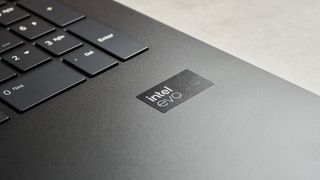
(Image
credit:
Future)
to
scroll
horizontally
|
Header Cell – Column 0 | Notes | Rating |
|---|---|---|
|
Value |
This is an expensive laptop, and yes, it’s large; but there are equally capable performers in this class for less. |
2.5 / 5 |
|
Design |
The LG Gram 17 is impressively light for a laptop of this size, but the build quality isn’t the best and the keyboard is hard to live with. |
2.5 / 5 |
|
Performance |
Fast where it counts, the LG Gram 17 lives up to its premium intentions in some regards, but the noise and heat are real issues. |
3 / 5 |
|
Battery |
Battery life is impressive, beating some of the best laptops around according to our benchmark tests. |
4 / 5 |
|
Overall rating |
The large and light LG Gram 17 is easy to carry around and performs well in certain scenarios, but the build quality, ergonomics, noise and heat hold it back. |
3 / 5 |
Buy
it
if…
Don’t
buy
it
if…
LG
Gram
17:
Also
consider
How
I
tested
the
LG
Gram
17
-
Tested
for
one
week -
Performed
various
tasks
and
benchmarking -
Plentiful
experience
with
PC
laptops
I
tested
the
LG
Gram
17
for
about
a
week,
trying
out
its
features
and
functions.
I
used
it
for
a
variety
of
tasks,
from
streaming
video
and
editing
photos,
to
general
productivity
and
browsing.
I
also
worked
with
it
on
a
desktop
and
my
lap
on
a
sofa,
and
in
various
lighting
conditions,
too.
I
commuted
with
it
to
test
its
portability.
I
put
the
LG
Gram
17
through
TechRadar’s
benchmarking
procedure,
which
involves
using
multiple
tools
repeatedly
to
test
laptops
and
desktops
as
thoroughly
as
possible.
These
emulate
various
workloads,
from
productivity
and
content
editing
to
gaming.
I
have
plenty
of
experience
with
laptops
of
all
varieties,
from
Windows
machines,
MacBooks
and
Chromebooks.
I
also
have
experience
testing
tablets
and
using
desktop
PCs
for
gaming.
First
reviewed
September
2024
